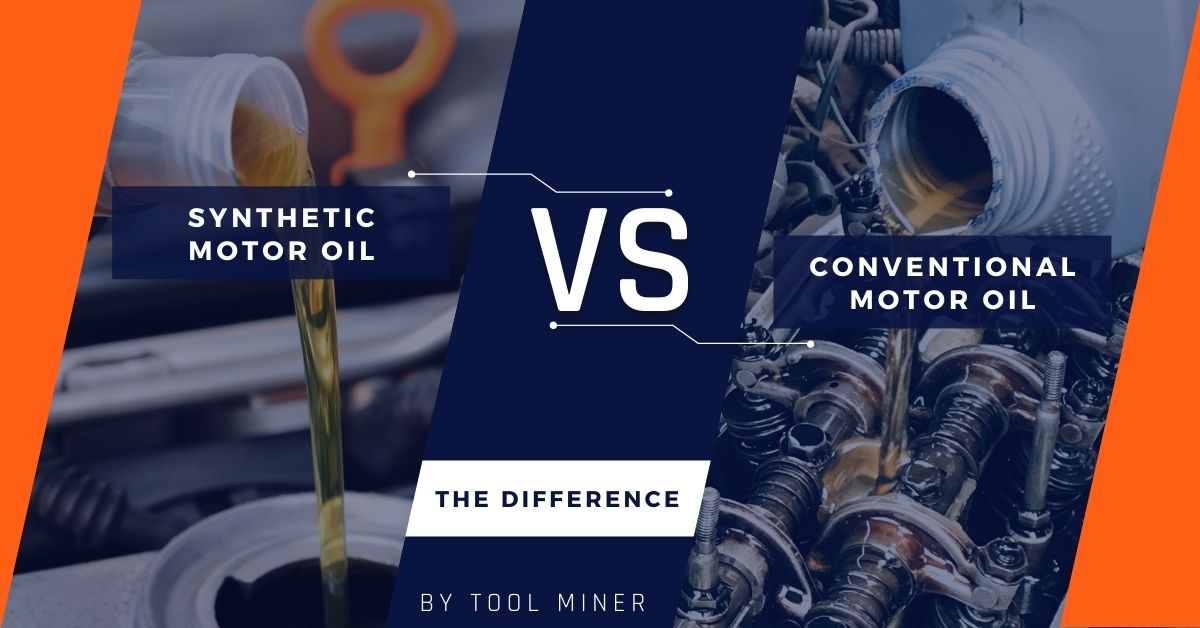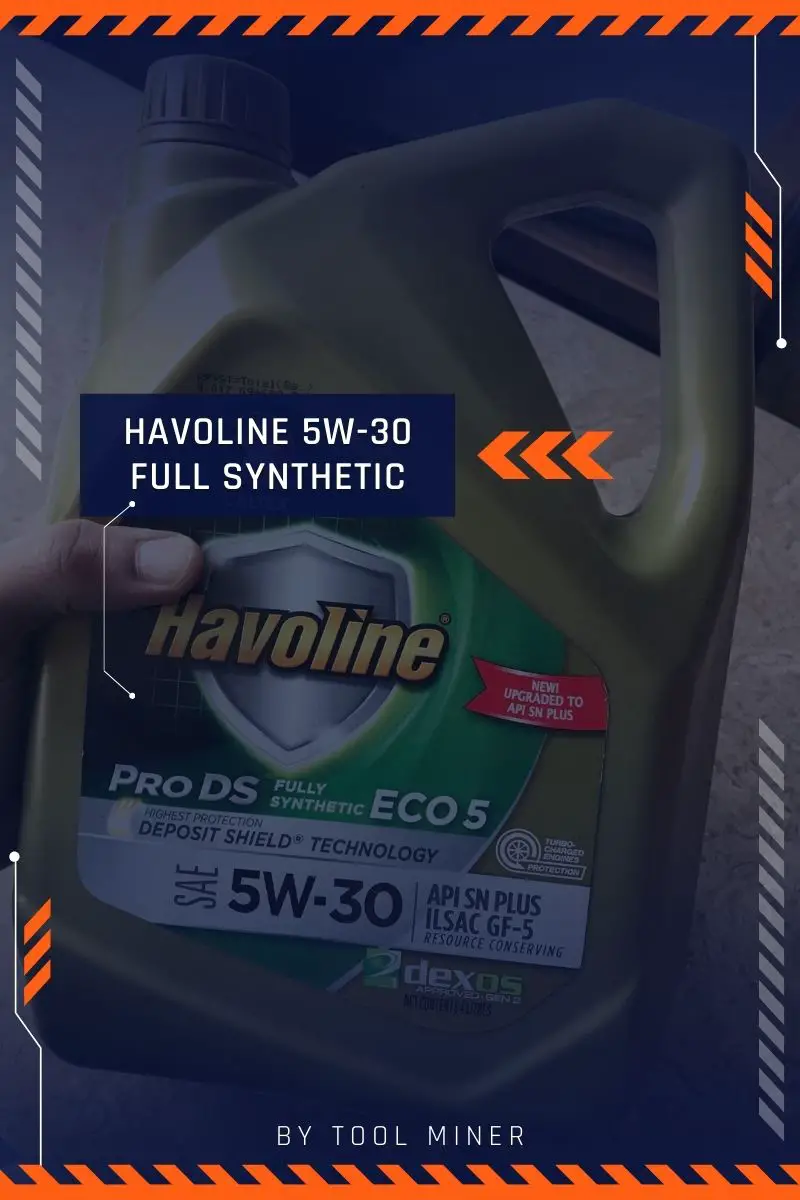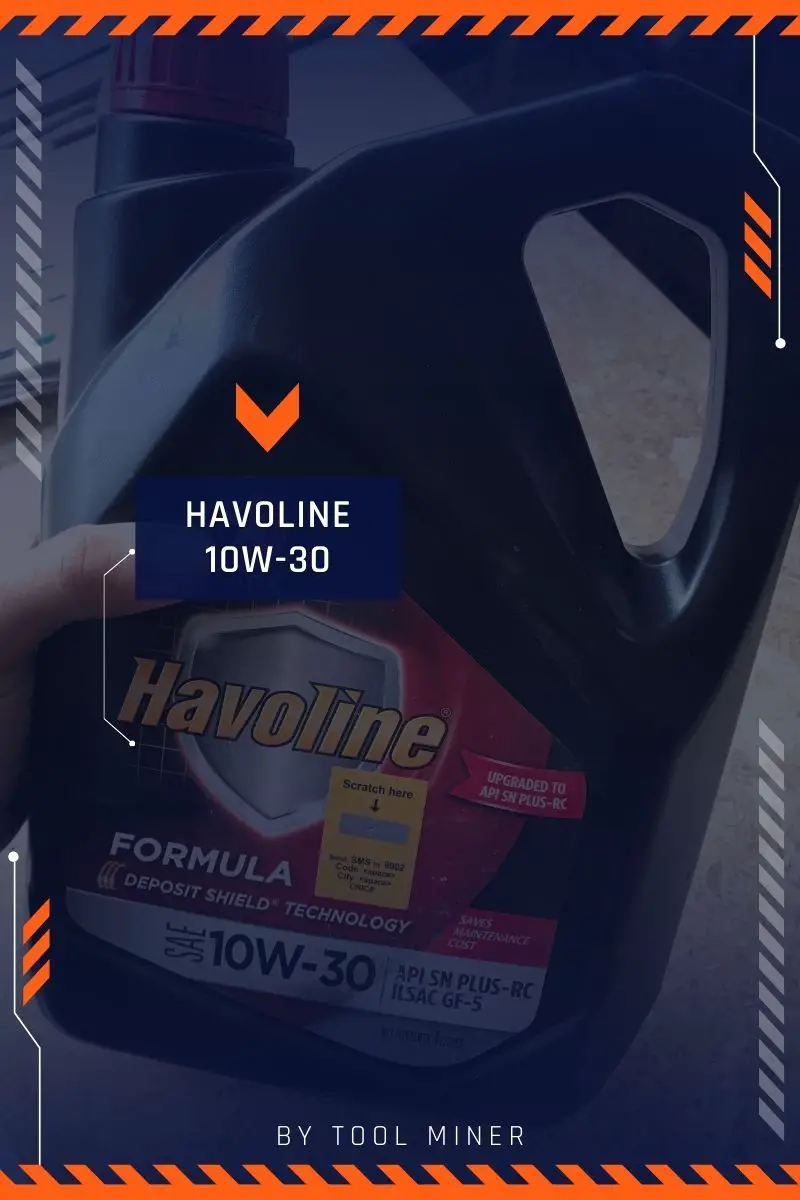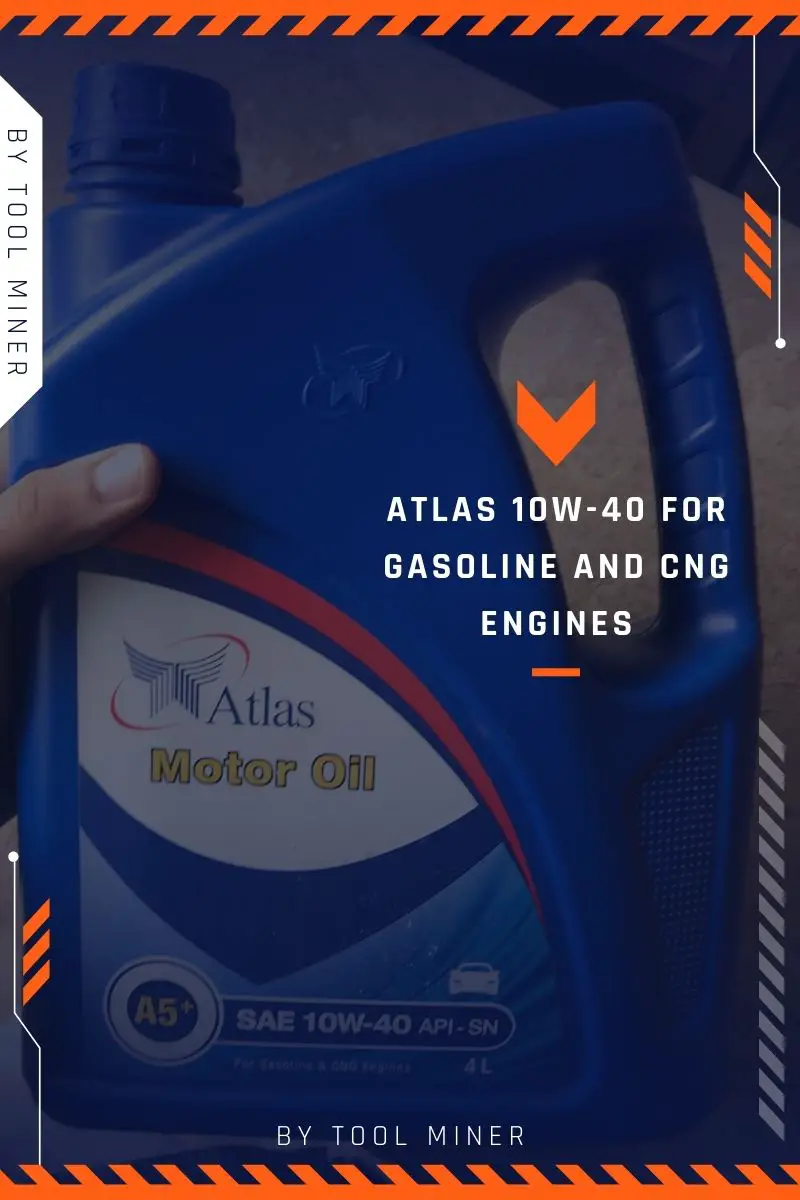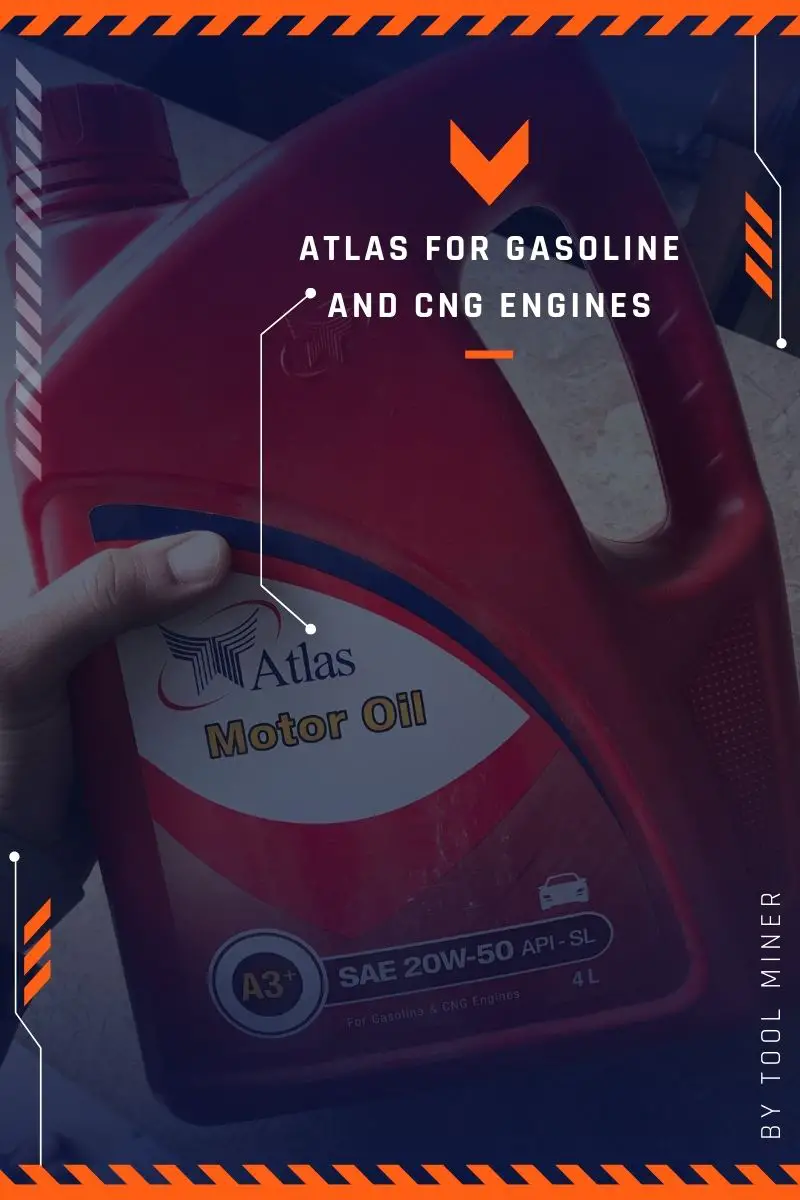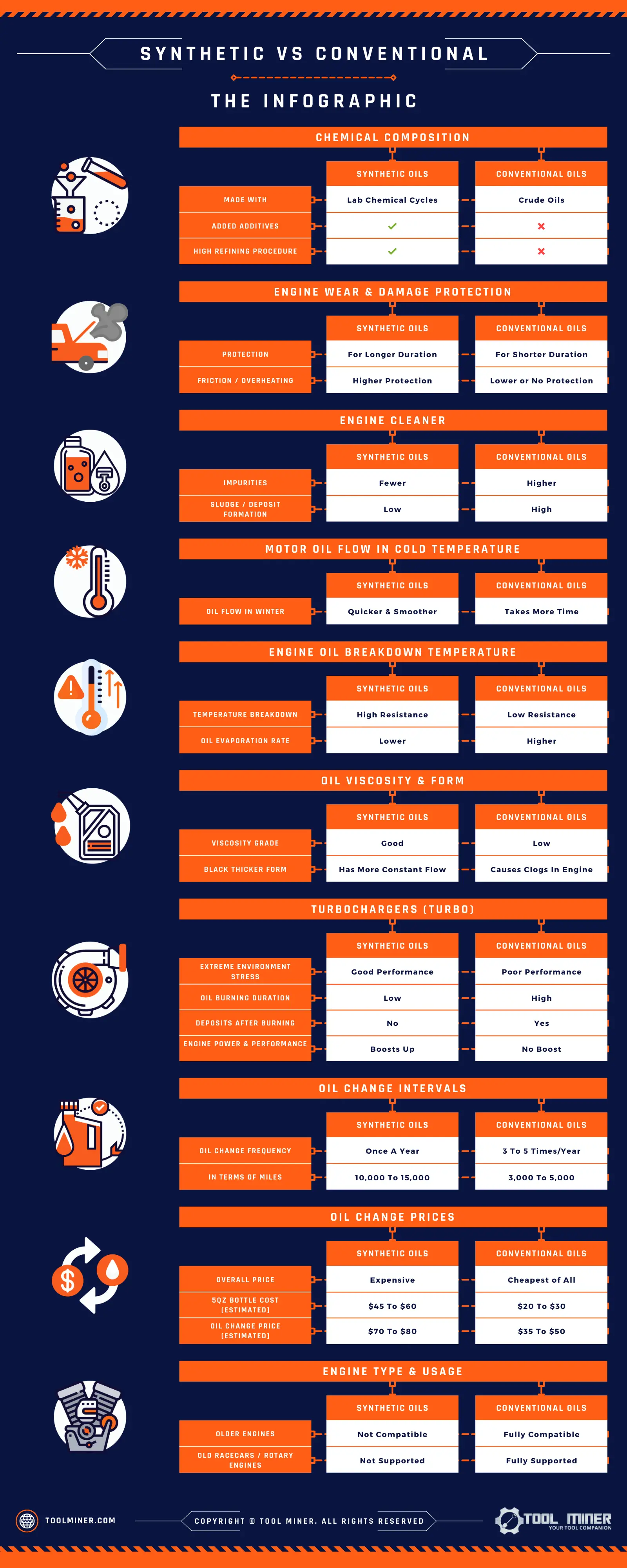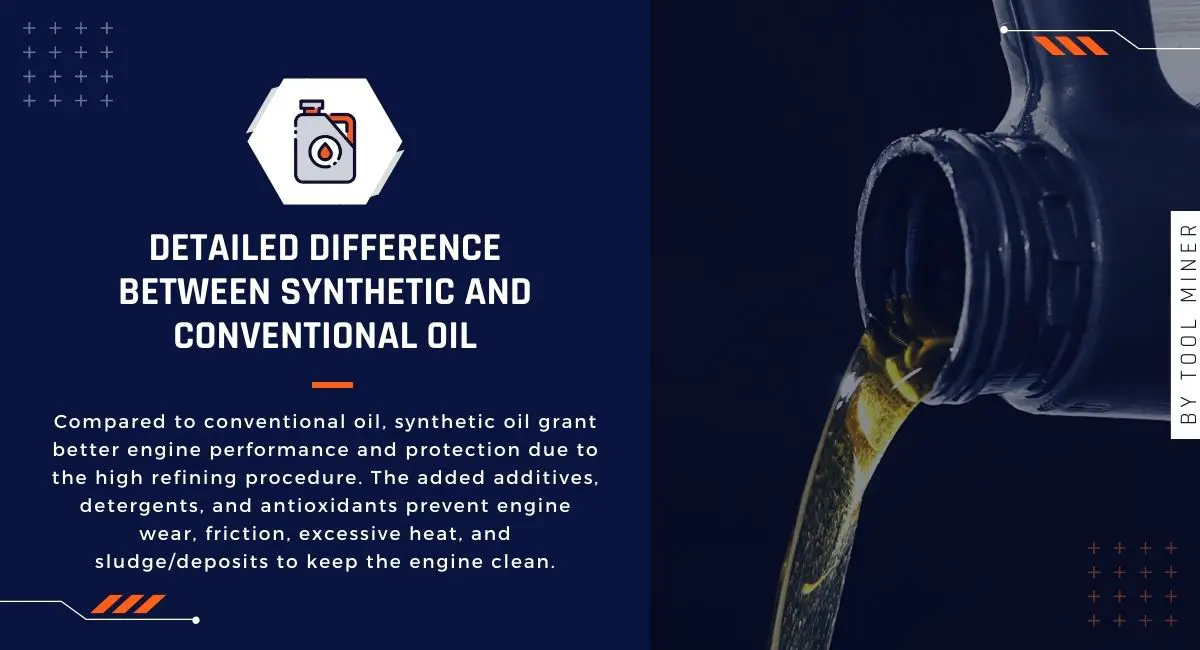Synthetic Vs Conventional Oil: Which Is Best For You?
Let me just cut to the chase here. In synthetic vs conventional oil there are some crucial things that make both of them better in their own right. Back in the years before 2019, conventional oils were always used for cars.
But, in these recent years, people have shifted to synthetic oils due to the benefits they grant over conventional oils. Not that the conventional is history but they are becoming rare and you’ll soon know why?
I have compared both oils in each and every aspect in every possible way that’s important for all car owners. Of course, I do have the ride manuals and manufacturer’s advice by my side.
But, you know It’s a bit difficult if you don’t know some of the technical stuff. If you ask me, you should know the viscosity, grading, additives, detergents, antioxidants, oil compatibility, etc.
I always check out both synthetic and conventional oils that are most suited for my Honda rides. Valvoline, Royal Purple, Castrol Edge, and Pennzoil are the best synthetic oils that I prefer.
Also, here are some of the shots, from when I was in the market looking for oils. Havoline is a famous one. But, Atlas you know is a local here.
Synthetic Vs Conventional Oil Comparison Table
Now, back to the task at hand, I have first, added a comparison table so you can easily compare different aspects of both synthetic and conventional oils.
| Differences | Synthetic Oils | Conventional Oils |
|---|---|---|
| Chemical Composition | ||
| Made With | Lab Chemical Cycles | Crude Oils |
| Added Additives | Yes | No |
| High Refining Procedure | Yes | No |
| Engine Wear & Damage Protection | ||
| Protection | For Longer Duration | For Shorter Duration |
| Friction/Overheating | Higher Protection | Lower or No Protection |
| Engine Cleaner | ||
| Impurities | Fewer | Higher |
| Sludge/Deposit Formation | Low | High |
| Motor Oil Flow In Cold Temperature | ||
| Oil Flow In Winter | Quicker & Smoother | Takes More Time |
| Engine Oil Breakdown Temperature | ||
| Temperature Breakdown | High Resistance | Low Resistance |
| Oil Evaporation Rate | Lower | Higher |
| Oil Viscosity & Form | ||
| Viscosity Grade | Good | Low |
| Black Thicker Form | Has More Constant Flow | Causes Clogs In Engine |
| Turbochargers (Turbo) | ||
| Extreme Environment Stress | Good Performance | Poor Performance |
| Oil Burning Duration | Low | High |
| Deposits After Burning | No | Yes |
| Engine Power/Performance | Boosts Up | No Boost |
| Oil Change Intervals | ||
| Oil Change Frequency | Once A Year | 3 To 5 Times/Year |
| In Terms of Miles | 10,000 To 15,000 | 3,000 To 5,000 |
| Oil Change Prices | ||
| Overall Price | Expensive | Cheapest of All |
| 5Qz Bottle Cost [Estimated] | $45 To $60 | $20 To $30 |
| Oil Change Price [Estimated] | $70 To $80 | $35 To $50 |
| Engine Type & Usage | ||
| Older Engines | Not Compatible | Fully Compatible |
| Old Racecars/Rotary Engines | Not Supported | Fully Supported |
Synthetic Vs Conventional Oil Infographic
Here is a quick infographic showing the difference between synthetic and conventional oil.
Detailed Difference Between Synthetic And Conventional Oil
Here I have written in with in-depth details based on my experience about how both oils work, differ, and the advantages/disadvantages both have…

Chemical Composition
One of the key differences that make synthetic oils completely apart from conventional oils is their chemical composition.
Synthetic Oils
- The synthetic oils at their core have additives and the manufacturing is carried out with a highly refined procedure.
Conventional Oils
- While on the other hand, conventional oils are just made with crude oil as their base. No high refining procedure is used in their production.

Engine Wear And Damage Protection
The engine oil act as a barrier between the engine parts. Because engine parts rub with each other and produce tremendous heat friction. This friction can damage your engine pretty quickly.
Synthetic Oils
- Synthetic oils maintain wear-protective properties for a longer duration due to the addition of additives and refining processes. Thus, it increases engine life by protecting your engine parts from wear and damage caused by friction and overheating.
Conventional Oils
- But, conventional oils break down quickly because they don’t have the additives and refining procedure. Their ability to halt the engine wear decreases accordingly. As a result, engine life will only decline as friction rises.

Engine Cleaner
Oil performs as your personal engine cleaner. It circulates through your engine and pickups up the deposits.
Synthetic Oils
- Synthetic oil contains fewer impurities. Thus, it can greatly repel deposit and sludge production. Due to a cleaner engine environment, the overall performance is also boosted.
Conventional Oils
- On the flip side of the coin, conventional oils are not that refined. They can quickly form sludge and deposits over time. This also negatively impacts the engine’s overall performance.

Motor Oil Flow In Cold Temperature
When you are not riding your ride, the oil doesn’t flow and settles. But, when the ignition fires up, the oil is also fired up and starts flowing. The oil rushes toward the important engine parts and guards against friction.
Especially in the winter months or if you live in colder regions. This process slows down to a greater extent. That’s why I always say that the cold temperature affects both you and your car.
Synthetic Oils
- Now in synthetic oils, this flow process is very quick even in winter. As you start your ride, the oils also start flowing. So, no damage-causing friction will happen as oil is flowing speedily and smoothly.
Conventional Oils
- In the case of conventional oils, the oil takes more time until it’s ready for smooth flow. This gap in time allows friction to dig its claws and cause engine wear.

Engine Oil Breakdown Temperature
Whenever are you driving, the engine runs along and becomes hot. With the passage of time, this high temperature causes faster engine oil breakdown or evaporation. Thus, exposing the engine to wear out quickly and easily.
Especially, in hot climates or if you are native to hot regions. It can also happen when you are in situations like hauling and towing.
Synthetic Oils
- Synthetic oils become more resistant to hot temperatures because of their refinement procedures, the addition of additives, and process cycles. Thus, they provide greater resistance to quicker engine oil breakdown.
Conventional Oils
- But, conventional oils are not the same. As soon as heat gets to them they start to evaporate or break down at a quick pace. That return exposes the engine to wear at high speed.

Oil Viscosity And Form
The oil with the passage of time becomes thicker and blacker like black tar. Because of the impurities, it has absorbed. The more viscous it becomes the more sluggish it gets. Thus, the critical engine parts don’t receive the oil at the proper time and start falling apart.
One of the key differences that make synthetic oils completely apart is oil viscosity and form.
Synthetic Oils
- Synthetic oils have way better viscosity compared to conventional oils. That’s why they perform better both in cold and heat as I have mentioned above.
Even the black thicker form of synthetic oils has a more constant flow than conventional oils.
Conventional Oils
- On the flip side, conventional oils don’t have good viscosity because they don’t have additives in them. That’s the reason they have thicker and more viscous foam.
Not to mention the black thicker form which only becomes clogged in the engine parts.

Turbochargers (Turbo)
Turbochargers known as Turbo are turbine-driven forced induction systems. They are used to boost the engine’s power efficiency. These turbo-engines are way hotter than the normal ones. They burn internal fuels at immense speed.
According to MobilOil, the temperature of the oil can go beyond 400° Fahrenheit. The turboshaft can speed up to 200,00 RPM which is twice the speed a normal engine can achieve.
Synthetic Oils
- Synthetic oils in this extremely stress-loaded environment can perform smoothly. They don’t burn that rapidly and don’t leave any deposits behind. Protect your car engine by boosting the overall engine power for peak performance.
Conventional Oils
- On the dark side, conventional oils burn at 2x speed, especially in turbo-engines. The burned-up oil leaves deposits on your engine parts. Which causes engine failure at an amazingly high rate.

Oil Change Intervals
For an average car, it requires about 6 months to change the oil. If you count in miles it would be 7,500 miles for an average car.
Synthetic Oils
- Synthetic oils have fewer impurities and with added additives, the deposits are cleaned quickly and effortlessly. Thus, the oil change intervals are quite amazingly long.
For Example – Cars with synthetic oils running in them only require to change oil only once a year. In terms of miles, it would range from 10 to 15,000 miles which is 3 to 5x more than conventional oils.
Conventional Oils
- As for conventional oils, they don’t have the added benefit of additives. Plus, the impurities like sludge and deposits are inside them. So, the change intervals are relatively short.
For Example – Cars with conventional oils running in them need an oil change at regular intervals. In terms of miles, it would range from 3,000 to 5,000 miles which is 3 to 5x lower compared to synthetic oils.

Oil Change Prices
The oil price depends upon different factors such as the “Oil Change Intervals” as I have discussed above. But, aside from buying an oil bottle, the oil change prices according to the schedule for your car per year also matter in the longer run.
Synthetic Oil Change Prices
- In that regard, synthetic oil prices are 2x that of conventional oils because of the added additives, refining procedures, and chemical cycles used to make it.
For Example – The 5 Qz of synthetic oil can cost up to $45 to $60. While synthetic oil changes prices from $70 to $80.
Conventional Oil Change Prices
- As for conventional oils, they are the cheapest as they are just made from crude oils, and have no refining procedures, chemical cycles, and additives in them.
For Example – The same 5 Qz of conventional oil can cost up to $20 to $30. While conventional oil changes prices up from $35 to $50.

Engine Type And Usage
One of the critical issues is the oil you’re gonna use… is compatible with your car or not. Selecting the best synthetic oil for your car also relies on the age of your car. Because every car model or brand is specific and requires a specific grade of oil to properly run.
Synthetic Oils
- The synthetic oils in this matter lack behind. Because they are the types who came later in discovery after the conventional oils. So, most synthetic oils with their modern grading system are not compatible with old car engines.
For Example – Older rotary and racecar engines are not compatible with today’s synthetic oils.
Conventional Oils
- While conventional oils are the oldest motor oils that are been used even in the oldest of engines. So, almost all of the conventional oils are compatible with these older engines.
For Example – The same older rotary and racecar engines are compatible with conventional oils.
My Final Verdict To You
Well, the bottom line is synthetic oils work way better than conventional oils. The refining procedure grants better performance and protection against friction.
The added additives, detergents, and antioxidants clean up the engine deposits and reduce sludge formation.
They also prevent thickening in cold weather and reduce oxidation in heat. That’s why synthetic oils are far more reliable compared to conventional oils.
Due to the grading system determined by manufacturers, synthetic oils are available for a wider range of vehicles which increases their overall demand and usage.
The conventional motor oils will help your car in some way I think… But overall modern car engines now prefer synthetics.
The only problem is the price so far as I have seen. Due to the added benefits, the synthetic oil price also rises up. While on the flip side, conventional oils are cheaper.
But. I don’t want to bust up my car engine just for cheap oil. So, I prefer synthetic oils over conventional oils.
Synthetic Vs Conventional Oil FAQs
Q: Which Is Better Conventional Or Synthetic Oil?
Ans: In synthetic vs conventional oil, the synthetics grant better engine performance and protection due to the high refining procedure. The added additives, detergents, and antioxidants prevent engine wear, friction, heating up, and sludge/deposits to keep the engine clean. Grant smoother oil flow in cold temperatures and prevent quick oil degradation in hot temperatures.
Q: How Long Can Your Car Go Without An Oil Change?
Ans: If you’re using conventional oil then your car can go from 3,000 to 5,000 miles or even 7,500 miles. But, if you’re using synthetic oil then you can go up to 10,000 to 15,000 miles without an oil change.
Q: Can You Switch Between Regular And Synthetic Oil?
Ans: It’s just a motor oil myth that you can’t switch between conventional and synthetic oil. It’s perfectly fine to switch between oils that are compatible with each other.

